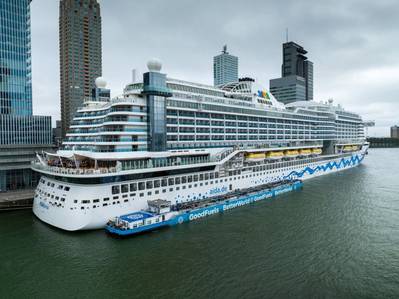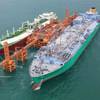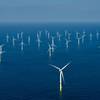Carnival's AIDA Cruises Makes Biofuels Foray
German cruise operator AIDA Cruises, a wholly owned subsidiary of Carnival Corporation, has for the first time started to use biofuels in regular ship operations as part of its CO2 emissions reduction efforts.
On July 21, 2022, during its layover in Rotterdam, AIDAprima became the first larger scale cruise ship to be bunkered with a blend of marine biofuel from Dutch supplier GoodFuels made from 100% sustainable raw materials such as waste cooking oil, and marine gas oil (MGO). The 125,572 GT AIDAprima is currently sailing on seven-day voyages to the metropolises of Western Europe and to Norway from/to Hamburg.
Felix Eichhorn, President AIDA Cruises, said, "We continue to actively explore all opportunities to decarbonize our fleet while advancing efficiency in line with international carbon intensity reduction targets. With the successful start of biofuel usage, we have proven that gradual decarbonization is possible even on ships already in service. An important prerequisite for us as a cruise line to be able to use it is that it becomes widely available on an industrial scale and at marketable prices."
GoodFuels' sustainable and certified biofuels are virtually free of sulfur oxides and offer CO2 reductions of 80 to 90% compared to fossil fuels. They are functionally equivalent to petroleum-derived fuels and can be used in already installed ship main engines without modifications to the engine or fuel infrastructure. This makes the use of biofuels in regular ship operations comparatively easy, unlike other technological investments.
Dirk Kronemeijer, CEO of GoodFuels, said, “This first bio-bunkering with AIDA Cruises marks an exciting step forward on the cruise industry’s decarbonization pathway, demonstrating that our sustainable biofuels are a safe, technically viable and convenient option to drastically cut down emissions from passenger vessels. As the effects of climate change are felt acutely in several parts of the world, the time for action is now, and biofuels are one of the few options that can already make a difference today.”
AIDA Cruises, which had previously tested the use of regenerated biofuels in marine diesel engines together with research partners at the University of Rostock, said its cooperation with GoodFuels will now be developed on a long-term basis.
The current project represents just a piece of AIDA Cruises' decarbonization strategy. In addition to the use of biofuels, this includes the installation of the first fuel cell on board AIDAnova and the commissioning of what is currently the largest battery storage system in cruise shipping with a capacity of ten megawatt hours on board AIDAprima. AIDA Cruises is also focusing on the expansion and increased use of shore power while in port.
Meanwhile, AIDA's parent company Carnival Corporation is aiming to reducing carbon emission intensity by 20% from its 2019 baseline by 2030, supporting its efforts and aspirations to achieve net carbon-neutral ship operations by 2050. The cruise giant said it has spent more than $350 million on energy efficiency improvements since 2016.











